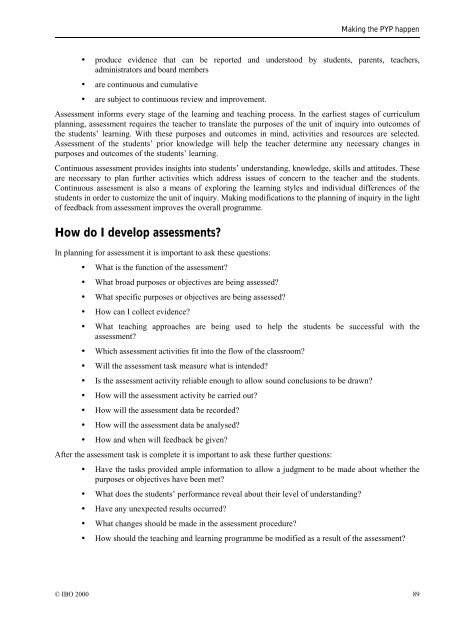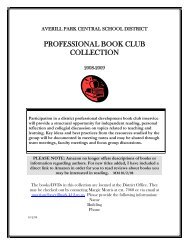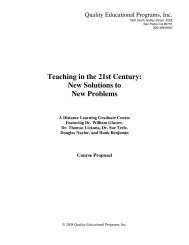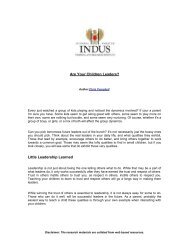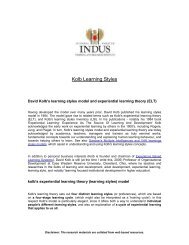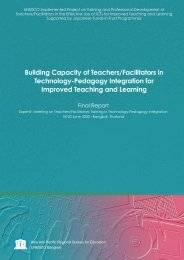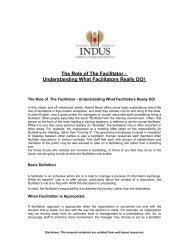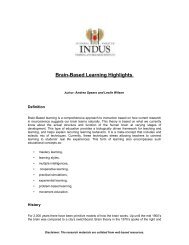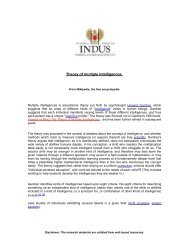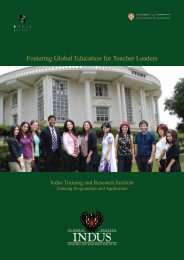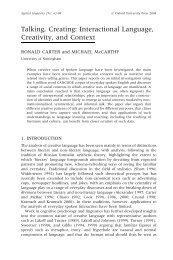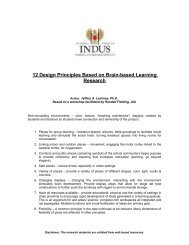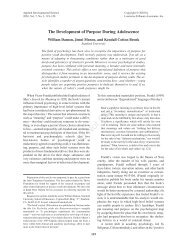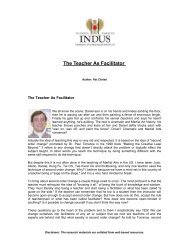Primary Years Programme Making the PYP happen - ITARI
Primary Years Programme Making the PYP happen - ITARI
Primary Years Programme Making the PYP happen - ITARI
- No tags were found...
You also want an ePaper? Increase the reach of your titles
YUMPU automatically turns print PDFs into web optimized ePapers that Google loves.
<strong>Making</strong> <strong>the</strong> <strong>PYP</strong> <strong>happen</strong><br />
! produce evidence that can be reported and understood by students, parents, teachers,<br />
administrators and board members<br />
! are continuous and cumulative<br />
! are subject to continuous review and improvement.<br />
Assessment informs every stage of <strong>the</strong> learning and teaching process. In <strong>the</strong> earliest stages of curriculum<br />
planning, assessment requires <strong>the</strong> teacher to translate <strong>the</strong> purposes of <strong>the</strong> unit of inquiry into outcomes of<br />
<strong>the</strong> students’ learning. With <strong>the</strong>se purposes and outcomes in mind, activities and resources are selected.<br />
Assessment of <strong>the</strong> students’ prior knowledge will help <strong>the</strong> teacher determine any necessary changes in<br />
purposes and outcomes of <strong>the</strong> students’ learning.<br />
Continuous assessment provides insights into students’ understanding, knowledge, skills and attitudes. These<br />
are necessary to plan fur<strong>the</strong>r activities which address issues of concern to <strong>the</strong> teacher and <strong>the</strong> students.<br />
Continuous assessment is also a means of exploring <strong>the</strong> learning styles and individual differences of <strong>the</strong><br />
students in order to customize <strong>the</strong> unit of inquiry. <strong>Making</strong> modifications to <strong>the</strong> planning of inquiry in <strong>the</strong> light<br />
of feedback from assessment improves <strong>the</strong> overall programme.<br />
How do I develop assessments<br />
In planning for assessment it is important to ask <strong>the</strong>se questions:<br />
! What is <strong>the</strong> function of <strong>the</strong> assessment<br />
! What broad purposes or objectives are being assessed<br />
! What specific purposes or objectives are being assessed<br />
! How can I collect evidence<br />
! What teaching approaches are being used to help <strong>the</strong> students be successful with <strong>the</strong><br />
assessment<br />
! Which assessment activities fit into <strong>the</strong> flow of <strong>the</strong> classroom<br />
! Will <strong>the</strong> assessment task measure what is intended<br />
! Is <strong>the</strong> assessment activity reliable enough to allow sound conclusions to be drawn<br />
! How will <strong>the</strong> assessment activity be carried out<br />
! How will <strong>the</strong> assessment data be recorded<br />
! How will <strong>the</strong> assessment data be analysed<br />
! How and when will feedback be given<br />
After <strong>the</strong> assessment task is complete it is important to ask <strong>the</strong>se fur<strong>the</strong>r questions:<br />
! Have <strong>the</strong> tasks provided ample information to allow a judgment to be made about whe<strong>the</strong>r <strong>the</strong><br />
purposes or objectives have been met<br />
! What does <strong>the</strong> students’ performance reveal about <strong>the</strong>ir level of understanding<br />
! Have any unexpected results occurred<br />
! What changes should be made in <strong>the</strong> assessment procedure<br />
! How should <strong>the</strong> teaching and learning programme be modified as a result of <strong>the</strong> assessment<br />
© IBO 2000 89


